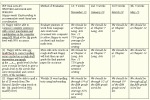Educators recognize the need for parental involvement in their children’s education and not just in signing agendas and ensuring work gets done (although that is a very valuable contribution to a child’s success at school). We love our parent volunteers and participants in school events. Such behaviour truly reinforces a good attitude towards learning and self-esteem in kids.
Now, onto the focus of this blog. I remember when my daughter was in grade 4 and I received a f orm letter from her teacher informing me that the sex education unit was about to be taught in class, and if I didn’t want her to participate, I could have her withdrawn from class during that time. And you know what? I actually gave that serious thought. I thought 9-years-old was a little young for a child to be studying human sexuality and reproduction. I didn’t want her to lose her childhood innocence. I look at that perspective differently now. I received the same education starting in grade 5 and it didn’t forfeit my childhood.
orm letter from her teacher informing me that the sex education unit was about to be taught in class, and if I didn’t want her to participate, I could have her withdrawn from class during that time. And you know what? I actually gave that serious thought. I thought 9-years-old was a little young for a child to be studying human sexuality and reproduction. I didn’t want her to lose her childhood innocence. I look at that perspective differently now. I received the same education starting in grade 5 and it didn’t forfeit my childhood.
I thought the letter home was sensible and a good preparation for families to be aware that their child would be learning about “where babies come from.” This was the school’s means of communi cating with families about curriculum. In the public school system, however, parent advocates are becoming fanatical about teachers sending letters home to the family whenever certain words, phrases, or perspectives in curriculum will be taught. For instance, there are certain parent-run advocacy groups, who “appear . . . to be irate about gay students,” and cannot tolerate gay and lesbian clubs in public schools. They want to know if these words, that is, gay and lesbian (shhhhh!), are being used in class and if so, will the teacher be promoting homosexuality. Hence, should a lesson be scheduled that includes homosexuality, or the use of the word homosexuality, the classroom teacher must send home a letter to families in advance, giving them the option to pull their children from class.
cating with families about curriculum. In the public school system, however, parent advocates are becoming fanatical about teachers sending letters home to the family whenever certain words, phrases, or perspectives in curriculum will be taught. For instance, there are certain parent-run advocacy groups, who “appear . . . to be irate about gay students,” and cannot tolerate gay and lesbian clubs in public schools. They want to know if these words, that is, gay and lesbian (shhhhh!), are being used in class and if so, will the teacher be promoting homosexuality. Hence, should a lesson be scheduled that includes homosexuality, or the use of the word homosexuality, the classroom teacher must send home a letter to families in advance, giving them the option to pull their children from class.
Heather Mallick, a reporter for the Toronto star, states in her column that sinful issues include “evolution, social acceptance of gays and lesbians, birth control and “environme ntal worship.” PEACE Hamilton (Public Education Advocates for Christian Equity) provided a form list of things that angry parents can demand their children not be exposed to in class. The “traditional values letter,” being sent out by some Muslim parents in Toronto’s Thorncliffe Park area, “includes situational ethics, Satanism, new age beliefs, bestiality, homosexuality, birth control, abortion, the encouraging of infanticide and the notion that condoms might help ward off disease”.
ntal worship.” PEACE Hamilton (Public Education Advocates for Christian Equity) provided a form list of things that angry parents can demand their children not be exposed to in class. The “traditional values letter,” being sent out by some Muslim parents in Toronto’s Thorncliffe Park area, “includes situational ethics, Satanism, new age beliefs, bestiality, homosexuality, birth control, abortion, the encouraging of infanticide and the notion that condoms might help ward off disease”.
After I wiped the tears of laughter out of my eyes, I found myself posing the same question as Mallick, who teaches bestiality?And th e ongoing debate between evolution and God (something PEACE has not initiated) is a curious one. I am a Roman Catholic teacher teaching in an RC school and I fully support the concept of evolution. There is too much valid scientific evidence proving the existence of Cro-Magnum Man, Neanderthals, and other pre-human species to argue the point. I really like the Lucy story, hypothetically explaining the first semi-humans to begin walking upright. Cool.
e ongoing debate between evolution and God (something PEACE has not initiated) is a curious one. I am a Roman Catholic teacher teaching in an RC school and I fully support the concept of evolution. There is too much valid scientific evidence proving the existence of Cro-Magnum Man, Neanderthals, and other pre-human species to argue the point. I really like the Lucy story, hypothetically explaining the first semi-humans to begin walking upright. Cool.
In all seriousness, the angry coalition of parents is demanding that teachers send home form le tters to parents every time the aforementioned subject matter will (or might) be taught to students. Thus, the teacher must advise specific students to leave class for 20 minutes, or go home, and others to put on noise-cancelling headphones (that will work well with the school policy of not using cell phones, iPods and other distracting technology in class). And I love the implication as to using noise-cancelling headphones. It’s reassuring to know that my teaching is nothing more than noise. Thank you for that.
tters to parents every time the aforementioned subject matter will (or might) be taught to students. Thus, the teacher must advise specific students to leave class for 20 minutes, or go home, and others to put on noise-cancelling headphones (that will work well with the school policy of not using cell phones, iPods and other distracting technology in class). And I love the implication as to using noise-cancelling headphones. It’s reassuring to know that my teaching is nothing more than noise. Thank you for that.
So far it is only the public schools that are beginning to make noise about these blasphemous issues, but often where you have the origins of a movement in one school system, you end up with some influence over another. Hopefully this won’t happen in Dufferin-Peel. I can’t see my board taking up such a foolish and clearly prejudiced movement in its schools. But should it ever come to that (and that is a long shot, at best), I’d better get my computer updated and the cartridge replaced in my printer. I’m going to be using a lot of overtime typing form letters about classroom vocabulary, where instead I could have been grading children’s work, or preparing materials for the next day’s lessons.






![59445258-woman-crying[1]](https://ontarioeducation.files.wordpress.com/2011/04/59445258-woman-crying11.jpg?w=150&h=110)





